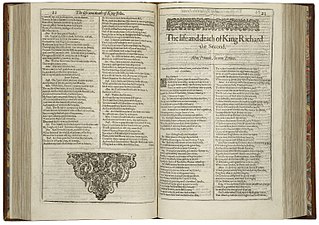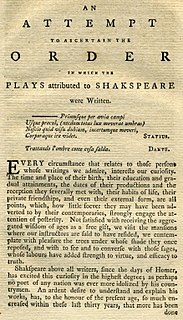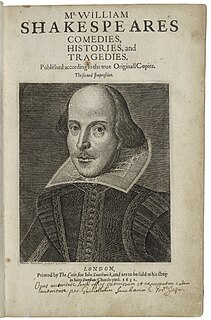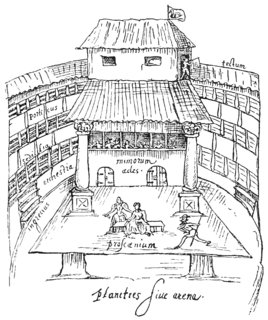
Macbeth is a tragedy by William Shakespeare; it is thought to have been first performed in 1606. It dramatises the damaging physical and psychological effects of political ambition on those who seek power for its own sake. Of all the plays that Shakespeare wrote during the reign of James I, who was patron of Shakespeare's acting company, Macbeth most clearly reflects the playwright's relationship with his sovereign. It was first published in the Folio of 1623, possibly from a prompt book, and is Shakespeare's shortest tragedy.

William Shakespeare was an English poet, playwright and actor, widely regarded as the greatest writer in the English language and the world's greatest dramatist. He is often called England's national poet and the "Bard of Avon". His extant works, including collaborations, consist of approximately 39 plays, 154 sonnets, two long narrative poems, and a few other verses, some of uncertain authorship. His plays have been translated into every major living language and are performed more often than those of any other playwright.

The earliest texts of William Shakespeare's works were published during the 16th and 17th centuries in quarto or folio format. Folios are large, tall volumes; quartos are smaller, roughly half the size. The publications of the latter are usually abbreviated to Q1, Q2, etc., where the letter stands for "quarto" and the number for the first, second, or third edition published.

King Richard the Second is a history play by William Shakespeare believed to have been written in approximately 1595. It is based on the life of King Richard II of England and is the first part of a tetralogy, referred to by some scholars as the Henriad, followed by three plays concerning Richard's successors: Henry IV, Part 1; Henry IV, Part 2; and Henry V.

This article presents a possible chronological listing of the composition of the plays of William Shakespeare.

The Shakespeare apocrypha is a group of plays and poems that have sometimes been attributed to William Shakespeare, but whose attribution is questionable for various reasons. The issue is separate from the debate on Shakespearean authorship, which addresses the authorship of the works traditionally attributed to Shakespeare.
The King's Men was the acting company to which William Shakespeare (1564–1616) belonged for most of his career. Formerly known as The Lord Chamberlain's Men during the reign of Queen Elizabeth I, they became The King's Men in 1603 when King James I ascended the throne and became the company's patron.
Henry Condell was an actor in the King's Men, the playing company for which William Shakespeare wrote. With John Heminges, he was instrumental in preparing and editing the First Folio, the collected plays of Shakespeare, published in 1623.
The Lord Chamberlain's Men was a company of actors, or a "playing company" as it would have been known, for which Shakespeare wrote for most of his career. Richard Burbage played most of the lead roles, including Hamlet, Othello, King Lear, and Macbeth while Shakespeare himself performed some secondary roles. Formed at the end of a period of flux in the theatrical world of London, it had become, by 1603, one of the two leading companies of the city and was subsequently patronized by James I.

Sejanus His Fall, a 1603 play by Ben Jonson, is a tragedy about Lucius Aelius Sejanus, the favourite of the Roman emperor Tiberius.

Every Man out of His Humour is a satirical comedy written by English playwright Ben Jonson, acted in 1599 by the Lord Chamberlain's Men. It is a conceptual sequel to his 1598 comedy Every Man in His Humour. It was much less successful on stage than its predecessor, though it was published in quarto three times in 1600 alone; it was also performed at Court on 8 January 1605.
Augustine Phillips was an Elizabethan actor who performed in troupes with Edward Alleyn and William Shakespeare. He was one of the first generation of English actors to achieve wealth and a degree of social status by means of his trade.
Alexander Cooke was an actor in the King's Men and the Lord Chamberlain's Men, the acting companies of William Shakespeare, John Heminges and Richard Burbage.
Nicholas Tooley was a Renaissance actor in the King's Men, the acting company of William Shakespeare.

The Second Folio is the 1632 edition of the collected plays of William Shakespeare. It follows the First Folio of 1623. Much language was updated in the Second Folio and there are almost 1,700 changes.
The Beaumont and Fletcher folios were two large folio collections of the stage plays of John Fletcher and his collaborators. The first was issued in 1647, and the second in 1679. The two collections were important in preserving many works of English Renaissance drama.

Thomas Pavier was a London publisher and bookseller of the early seventeenth century. His complex involvement in the publication of early editions of some of Shakespeare's plays, as well as plays of the Shakespeare Apocrypha, has left him with a "dubious reputation."
King's Men personnel were the people who worked with and for the Lord Chamberlain's Men and the King's Men from 1594 to 1642. The company was the major theatrical enterprise of its era and featured some of the leading actors of their generation — Richard Burbage, John Lowin, and Joseph Taylor among other — and some leading clowns and comedians, like Will Kempe and Robert Armin. The company benefitted from the services of William Shakespeare, John Fletcher, and Philip Massinger as regular dramatists.
The following outline is provided as an overview of and topical guide to the life and legacy of William Shakespeare:
Robert Gough, also Goughe or Goffe, was an English actor who took female parts in Shakespeare's plays. He was the father of actor Alexander Gough.














